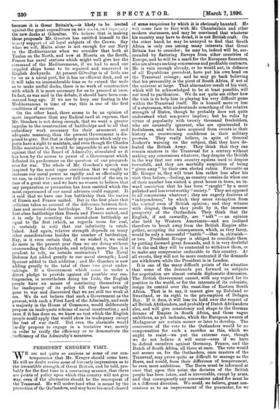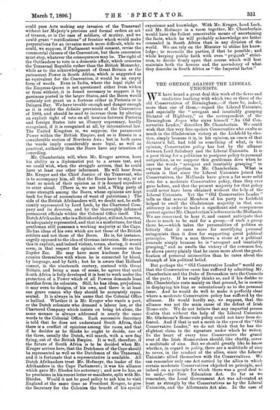PRESIDENT KRUGER'S VISIT.
WE are not quite so anxious as some of our con- temporaries that Mr. Kruger should come here. He will no doubt revive some of his early impressions as to the irresistible strength of Great Britain, and be told, pro- bably for the first time in a convincing manner, that there are points of policy upon which this country will not give way, even if ,the alternative should be the reconquest of the Transvaal. He will undents.nd what is meant by the protection of the Outlanders, and may have his mind cleared of some suspicions by which it is obviously haunted. He will come face to face with Mr. Chamberlain and other modern statesmen, and may be convinced that whatever his country may have to dread, it is not British craft. On the other hand, he may be annoyed to find that South Africa is only one among many interests that Great Britain has to consider; he may be, indeed will be, sur- rounded by flattering Envoys from other countries of Europe, and he will be a mark for the European financiers, who are always seeking concessions and profitable contracts. He is vain enough already, or he would not, in defiance of all Republican precedent, have put his own head on the Transvaal coinage; and he may go back believing that his personality is the pivot of South Africa, if not of the universe at large. That alternative result of his visit, which will be acknowledged to be at least possible, will not tend to pacification. We do not quite see either how the visit is to help him in playing his very difficult game within the Transvaal itself. He is himself more or less of a statesman, who understands something of the relative strength of States, though he probably does not quite understand what sea-power ; but he rules by virtue of popularity with twenty thousand freeholders, who are unusually ignorant, who are opinionated to foolishness, and who have acquired from events in their history an overweening confidence in their military prowess. They really believe, in spite of General Joubert's warning on the subject, that they have de- feated the British Army. They think that they can remain masters in the Transvaal for a century without making any concessions whatever, they despise the British in the way that our own country squires used to despise townsfolk, and they are morbidly suspicious of being "given away" by their own elected rulers. Favourite as Mr. Kruger is, they will trust him rather less after his visit than before,—feeling, as country cousins do when one of their number has visited a great house in town, an in- ward conviction that he has been " caught " by a more polished and less trustworthy "society." They are opposed to all concessions whatever ; they are eagerly desirous of "independence," by which they mean exemption from the control even of British opinion; and they witness with disgust, though they profit by it, the immense prosperity of the Outlanders. They think that the English, if not cowardly, are " soft " — an opinion also held by Western Americans—and are inclined therefore to break away from the British Empire alto- gether, accepting the consequences, which, as they fancy, would be only a successful "battle "—that is, skirmish— or two. President Kruger is obliged to conciliate them by putting forward great demands, and it is very doubtful if in the end they will be contented to withdraw them, or to make any compromise endurable to this country. At all events, they will not be more contented if the demands are withdrawn while the President is in London.
It is one of the many difficult points of the situation that some of the demands put forward as subjects for negotiation are almost outside diplomatic discussion. The British Government cannot, with any regard for its position in the world, or for the interests of its colonists, resign its control over the coast-line of Eastern South Africa. That is to say, it cannot give up Zululand or Swaziland, or its right to the pre-emption of Delagoa Bay. If it does, it will lose its hold over the respect of all British Afrikanders, and probably of Dutch Afrikanders also, and will give consistency and shape to the German dreams of Empire in South Africa, and those vague ambitions, as yet inchoate, which the European owners of Madagascar are certain sooner or later to develop. The concession of the vote to the Outlanders would be no compensation for such a sacrifice as this, which we ought to resist—we put the extreme case, though we do not believe it will occur—even if we have to defend ourselves against Germany, France, and the Dutch of South Africa, all three at once. The vote would not secure us, for the Outlanders, once masters of the Transvaal, may prove quite as difficult to manage as the Boers, and would, from their difference of temperament, be even more ambitious. The Boers must be informed at once that upon this point the decision of the British people has been taken, and is irrevocable, except by arms, and that consequently any concessions asked for must lie in a different direction. We could, we believe,.grant con- cessions as to an improvement of the guarantee, for we could pass Acts making any invasion of the Transvaal without her Majesty's previous and formal orders an act of treason, or in the case of soldiers, of mutiny, and we could grant "rectifications" of frontier which would make preparations for an invasion much more difficult, while we could, we suppose, if Parliament would consent, revise the commercial clauses of the Convention, but there concession must stop, whatever the consequences may be. The right of the Outlanders to vote is a domestic affair, which concerns the Transvaal Republic rather than the British Monarchy, while as to the acknowledgment of Great Britain as the paramount Power in South Africa, which is suggested as an equivalent for the Convention, it would be an empty form of words. Even in India, where the legal right of the Empress-Queen is not questioned either from within or from without, it is found necessary to support it by garrisons posted in the larger States, and the Boers would certainly not grant us a fortress either in Pretoria or in Delagoa Bay. We have trouble enough and danger enough as it is under the definite provisions of the Convention of 1884, and should be mad to increase them by altering an explicit right of veto on all treaties between Pretoria and foreign States into an illusory supremacy, hardly recognised, if it is recognised at all, by international law. The United Kingdom is, we suppose, the paramount Power within the British Empire, and so is Russia in a considerable section of Northern Asia ; but in both cases the words imply considerably more legal, as well as practical, authority than the Boers have any intention of conceding. Mr. Chamberlain will, when Mr. Kruger arrives, have his ability as a diplomatist put to a severe teat, and we could wish, when the struggle arrives, that he could have at least one other informant. He will hear from Mr. Kruger and the Chief Justice of the Transvaal, who is to accompany him, all that the Boers have to say, or at least so much of their opinion as it is deemed expedient to utter aloud. (There is, we are told, a Whig party of some strength among the Boers, whose opinions are kept back for fear of accusations of want of patriotism.) The side of the British Afrikanders will, we doubt not, be suffi- ciently represented by Lord Loch, by the Chartered Com- pany and its devotees, and by the thoroughly informed permanent officials within the Colonial Office itself. The Dutch Afrikan der, who is &British subject, will not, however, be adequately represented, and that is a misfortune, for that gentleman still possesses a working majority at the Cape. He has ideas of his own which are not those of the British settlers and not those of the Boers. He is, for instance, angrily opposed to the idea of German intrusion. He avows this in explicit, and indeed violent, terms, sharing, it would seem, in that respect the opinion of his cousins on the Zuyder Zee. He may have more kindness for those cousins themselves with whom he is connected by blood, by language, and by faith ; but he is aware that Holland cannot, in the nineteenth century, contend with Great Britain, and being a man of sense, he agrees that until South Africa is fully developed it is best to work under the protection of a Power which of all Powers demands least sacrifice from its colonists. Still, he has ideas, prejudices, it may even be designs, of his own, and there is at least one grave reason why they should be accurately repre- sented. It is always in his name that the Colonial Office is bullied. Whether it is Mr. Kruger who wants a port, or the Dutch colonists who demand a labour law, or the Chartered Company which insists on being let alone, the same menace is always addressed in nearly the same words to the Colonial Office. Each successive Secretary is told that he does not understand South Africa, that there is a conflict of opinions among the races, and that if he decides as he thinks he ought to decide, one of the three, usually the Dutch, will march, with a new flag flying, out of the British Empire. It is well, therefore, if the future of South Africa is to be decided when Mr. Kruger arrives here, that the Dutchmen of the Cape should be represented as well as the Dutchmen of the Transvaal, and it is fortunate that a representative is available. All Dutch Afrikanders trust Mr. Hofmeyr, the leader of the Afrikanders in the Cape Parliament ; it was his alliance which gave Mr. Rhodes his autocracy ; and now he has, as he proclaims in his recent letter or manifesto, split with Mr. Rhodes. Would it not be good policy to ask him to visit England at the same time as President Kruger, to give the Secretary for the Colonies the benefit of his special experience and knowledge. With Mr. Kruger, Lord Loch, and Mr. Hofmoyr in a room together, Mr. Chamberlain would have the fullest conceivable means of ascertaining the facts, which he will probably acknowledge are better concealed in South Africa than in any division of the world. We can rely on the Minister to utilise his know- ledge ; to reconcile the parties, if that be possible; and while keeping public faith with even " priggish " strict- ness, to decide firmly upon that course which will best maintain both the honour and the ascendency of what. they describe in South Africa as "the Imperial factor."







































 Previous page
Previous page